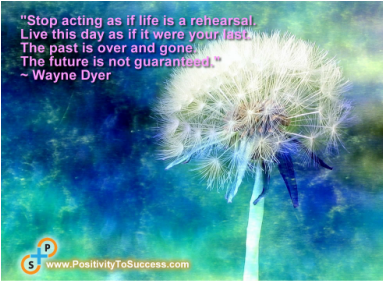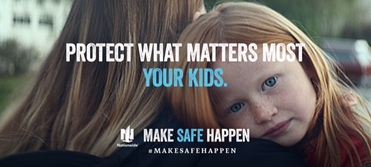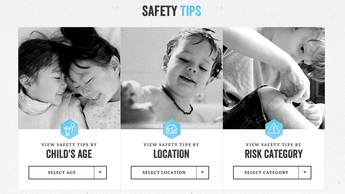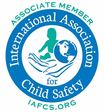
I've spent the better part of the last several weeks writing. Blog posts, Facebook posts, and Twitter posts on multiple sites and pages I manage. I've also spent a good deal of time reading and commenting on the posts of others. This post and it's subject matter have been swimming in my head for several weeks.
The crux of it is, we need to talk. There needs to be a conversation that not only starts, but continues. It's already started, but the focus is not where it needs to be. Perhaps I can help shift to focus to where it should be. Where it needs to be.
The Conversation
Most of the conversation the past few weeks has revolved around two things. Child Safety and kids dying. Two things I am clearly passionate about, and for me, have been part of my conversations for the past ten years. It wasn't my choice to have these passions. It was born of circumstance. Circumstances that are now part of the fabric of who I am, what I do, and why I write.
Oddly, it seems many people don't understand how these two things go together. Or, perhaps more accurately, they do understand, but they don't want to think about it. They don't want it thrown in their face. Especially at a time when they are having a good time, gathered with friends and family, and expecting to be entertained by both by the people around them and what they are watching on TV.
Yes, I'm referring to the Superbowl and the highly controversial Nationwide ad for Make Safe Happen. I've written about it before and you can refer to that post for my feelings on the ad itself.
Having read many comments on many social media, news, and blog sites, I am saddened. Not just because so many people did not *get* the message, but the actual reason they did not get the message or outright refused to get the message, even when it was explained to them. DEATH SCARES THE S*IT OUT OF PEOPLE. Especially when it's about kids.
Death: Don't Wanna Even...
Am I wrong? Does the thought of a loved one dying, especially suddenly and unexpectedly, scare the pants off you? You don't want to think about it do you? You certainly don't want to think about what it would be like to get that phone call, that visit to your door from an officer, or the doctor and the social worker at the door of your loved one's hospital room. So many people refuse to create wills, health care proxies or power of attorney documents because they just don't want to think about death. Or think they can put it off until "later" and then, when death comes, later turns out to be tomorrow...
You fear your spouse having a heart attack or being in a fatal car accident. You know your loved one with cancer is fighting for their life but you don't want to consider they might not win, even if they have. You absolutely don't want to ever have to go to a child's wake or funeral because it's just too hard to even think about, let alone have it be for YOUR CHILD.
So what do you do instead? You get pissed off when someone else confronts you with it. Especially if they confront you with it out of nowhere, when you were not expecting it. Even worse, if it's a time when you are gathered with friends and family in celebration.
Guess what. That's the point. That's what it's like for thousands of people every single day. Their perfectly happy lives are shattered when a loved one suddenly and unexpectedly dies. Death, like that ad, doesn't come when you are "ready" for it. It does not always come with a warning. It comes when it damn well pleases. Sometimes you can prepare for it, sometimes you cannot. Sometimes there are things you can do to prevent it, sometimes there are not. There is no good time for a loved one to die. None.
There was no better time to air that Nationwide ad. Why? A huge audience, full of parents. Who is their target audience? Parents. What was their goal? Education and yes, maybe even shock value. They wanted to get your attention, and they did. The message, preventable accidents are the # 1 cause of death to children and a kid can die just this fast, and when they do, this is how it feels. Don't like it? MAKE SAFE HAPPEN. It was that simple.
Misplaced Emotions or No Idea What to do with Them?
Of course people got pissed off. How dare Nationwide make me confront a subject I'm not comfortable with? How dare they do it when *I* am having a good time? How dare they not warn me they were going to "kill" my Superbowl buzz by killing a kid? They (you?) didn't want their happy family and friends feel good party "ruined." I get it.
Neither did I. On December 18th, 2004 I was supposed to be wrapping Christmas gifts and making cookies and crafts with my kids. Instead, I woke up to find my daughter crushed beneath her dresser. I spent half the day at hospitals. I came home with a box of her hand and foot prints and a lock of her hair. And overwhelming guilt. She went to the morgue. I didn't want Christmas ruined in 2004 (and for the rest of my life) when instead, I had to bury my daughter who died from a preventable tip-over accident 3 days before Christmas. I COULD HAVE PREVENTED HER DEATH!
Your Superbowl party might have been brought down by a commercial. My entire life came crashing down around me when my daughter died from a preventable accident. One I could have prevented, had I known of the danger. Had I believed the danger. Had I known the statistics. If only... Their goal was to educate you so you don't ever have to know what it's like to be me. Get it? That ad, might have saved my daughter's life if I'd seen it ten years ago.
Despite my pain, despite the trigger, I loved the ad. Why? IT CAN SAVE LIVES! It can prevent you from ever having to feel the pain I do. The pain millions of parents feel every year. The pain of losing a child to something you could have prevented. I already live with the pain of losing a child. An ad is not going to change that. If only it were that easy...
So I'm sorry your SuperBowl viewing experience was ruined for a few minutes. Really. But guess what? You then went back to your eating, drinking, laughing, and regularly scheduled life. My "regular" life is nothing like it was supposed to be. I'm sorry, but get over it.
Must Know Info: Grief is a Journey and it Lasts a Lifetime
You know, it's also interesting to me how many bereaved parents were outraged. They slammed Nationwide for being insensitive to bereaved parents. That bereaved parents were triggered by the commercial and it should not have been shown during the Superbowl. That showing an ad that depicted a child dying was in poor taste. They were angry they were watching with the bereaved siblings of the child that died, and they siblings may have also been upset by the trigger. Or fellow bereaved family members who took offense to their escapist Superbowl viewing being hijacked by a commercial that reminded them of their loss.
Look, I get it. I am a bereaved parent. I know the spot was a trigger. I know it blindsided people whether they had ever lost a child or not. Grief is forever. Triggers happen. They suck. I hate them as much as the next person. I knew what was coming and I still cried when it aired. It was powerful and compelling. Nationwide did not deliberately try to upset bereaved parents. Parents who did not lose a child to a preventable accident may have also missed the point of the ad, because of their own grief. That's understandable. Would there have been a "good" or "better" time to air that ad? If it triggered you then, it would have triggered you whenever you happened to see it. Perhaps you'd have been less likely to see it if it were not aired during the Superbowl.
Many of us prefer to be alone in our grief, or when triggered unexpectedly, but what about the benefit of having the support of others in our grief? What about taking advantage of having friends and family around to support each other, have a conversation, and help us work through our grief? Especially when something like this happens? That was the gift inside of this commercial for families who are bereaved for any reason, but especially the loss of a child. The opportunity to start or continue the conversation about death and grief. Of course if your loss was recent, this is often harder to do and I am sensitive to that. Really, I am.
Even if you had not ever lost a child, if you didn't like the ad during the Superbowl, you would not have liked it any better during your favorite reality, sitcom, or drama show, either.
The Truth
Let's be real and honest here. Your objection to the ad was not *really* that it aired during the Superbowl. It was that it involved the death of a child and it made you uncomfortable. That discomfort was likely amplified by the fact you were probably in a social environment, and with other people who were equally uncomfortable with a serious subject like the death of a child. You probably did not have much experience discussing death and/or are uncomfortable with it, or even if you did, you might have felt peer pressure to go along with the crowd and their reaction. Chances are you stuffed whatever emotion the ad dredged up in you, or, impulsively blamed Nationwide for YOUR discomfort with the death of a child (and likely completely missing the point of the ad), and went back to the party and the game.
I was watching with my two sons, who are obviously bereaved siblings. We talked about it right after it aired. They were not upset by it. They *got* it. Once they understood the reason the ad was made that way, and what it was really about, they were able to see the benefit. They were proud their sister is helping to save lives through Meghan's Hope and my involvement with the Nationwide Make Safe Happen campaign.
Why were my kids not upset? Probably largely because we *do* talk about death in this house. We talk about how Meggie died, why she died, and what we can do to prevent it from happening to others. I don't shelter them from death, I never have and I never will. Even when they were 3 and 6 the day she died, they were involved in all of it in an age-appropriate way. We are an open, honest, real family. We talk about triggers and that it can be upsetting when things remind us of her and the way she died. We talked about how others might not feel the same way we do and why. I want my kids to understand and be comfortable talking about death.
While talking about triggers, what about the 911 ad? How do you think victims of domestic violence felt about that ad? Don't you think it was a trigger for them? What about people who lost children to cancers or other illness and their reaction to the St. Jude commercial? What about alcoholics and people who lost loved ones to drunk driving and all the beer commercials? Triggers can happen to anyone, anywhere, anytime and for any reason. Yes, for those who have lost a loved one and especially a child they may be more intense, but there are other kinds of losses that cause just as strong of a grief reaction.
To a point, we can only relate to what we know and what we believe to be true. When it comes to grief, everyone does it differently. Everyone brings to any discussion their personal, cultural, religious and spiritual beliefs along with their personal life experience.
The Power of Choice
Yet we always have a choice. We can choose to be pissed off and self-absorbed about our personal feelings about anything, in this case the Nationwide ad, and the fact they used a child that died from a preventable accident to educate parents that preventable accidents are the #1 cause of death to children. That their kids could be at risk. Really. Not someone else's kids. THEIR kids. YOUR kids.
Nationwide made it real. Reality, when it involves death, makes most of us uncomfortable.
Instead of getting the message. Instead of going to the makesafehappen website or checking out the app to see what it was all about, people lashed out against Nationwide for "killing a kid during the Superbowl." They chose to place blame on Nationwide for how it made them feel. Nationwide did not "make" you feel or do anything. That's all you. They created an emotional, compelling, PSA. How you chose to react to it was all you. Really, we need to start owning our feelings, understanding them, and stop blaming others, no matter what it is we feel. The only person responsible for how you feel is you.
Let me say that again. The only person responsible for how you feel is you.
I propose it was much less about how people felt about the commercial itself and a whole lot more about how death-averse we are as a society. People missed both messages embedded in that commercial. In doing so, they missed both an opportunity to learn more about preventable accidents and making kids safer and they missed the opportunity to have a real, honest, and important conversation about death, dying, and grief.
The Conversation Begging to be Had
Here is the thing. Death is part of life. We are all going to die. We all know that, but no one seems to want to actually acknowledge it until they have no choice. Yes, we would love to believe that we will all live long, happy, healthy and full lives and die of old age when we are damn good and ready to.
Except life doesn't always work that way.
People die. Some after living long, fulfilling, wonderful lives. Some before they are born. Some die of horrible diseases they did not ask for or deserve. Some die in car accidents or plane crashes that were no fault of their own. Some will have a heart attack or stroke with no risk factors or warning signs. Some die trying to save the lives of others like the members of our armed forces or first responders. Some are horribly murdered. Some commit suicide. Some die in an accident that may have been preventable. Sometimes the victims of these accidents are kids.
There is never a good time to lose someone we love. When kids die, it hits us especially hard. Even if we don't know them. Why? Kids are not supposed to die. Certainly not before their parents. Of course not everything that takes the life of a child can be prevented. But many accidents can be prevented. Why would you not want to do everything you can to protect children so they have every opportunity to live long, happy, and healthy lives?
Nationwide started a conversation. They want to educate people that accidents are the #1 cause of death to children. They want to teach parents and those who care for children what the dangers are and how to make their homes and their children safer. It's that simple. It's that important. They provided a wonderful resource and information in the Make Safe Happen website and app. They want to save the lives of children.
I want to take it one step further. Let's also let it be a catalyst for talking about death, dying, and grief. Let's learn how to support others who have lost someone they love. Let's learn how to support someone who is dying and those who love them. Let's talk to our families about what would be important to us when we are facing the end of life or after we die. I've tried to start this conversation, at least with regard to understanding and supporting bereaved parents, with my book Out of the Darkness.
What you can do
I ask of you two things.
First, If you've not yet done so, please visit the Make Safe Happen Website and download the app or, if you don't have young children in your life, share it with someone who does. Learn what Nationwide's ad was really about.
Second, make a date on your calendar to talk to your spouse, significant other, children, family members and/or friends about what would be important to you if you were dying. What you'd want after you die for services. Create a health care proxy, power of attorney, and will if you've not done so already. Don't wait for a health crisis, or for when you get older, or allow it to be put off over and over again. Do it now. It will make everything so much easier when death does come knocking for everyone involved.
Be the change.
Thank you.
Meghan’s Hope and Nationwide are partners in the Make Safe Happen campaign. While all opinions expressed here are my own, I have received compensation from Nationwide for promotion of their Make Safe Happen campaign materially or financially.




 RSS Feed
RSS Feed